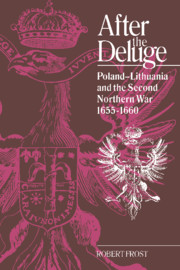Book contents
- Frontmatter
- Contents
- Preface
- Gazeteer
- Glossary
- Office holders
- List of abbreviations
- Pronunciation guide
- Genealogical tables
- Maps
- 1 Introduction: Poland—Lithuania in the midseventeenth century
- 2 The Deluge
- 3 Recovery: July 1655-August 1656
- 4 The widening conflict: June-December 1656
- 5 Constructing a coalition: January-December 1657
- 6 The succession and the failure of the coalition: January—July 1658
- 7 Political reform
- 8 Towards a French candidature: 1658–1660
- 9 Conclusion: the succession and the failure of reform
- Bibliography
- Index
- CAMBRIDGE STUDIES IN EARLY MODERN HISTORY
7 - Political reform
Published online by Cambridge University Press: 04 November 2009
- Frontmatter
- Contents
- Preface
- Gazeteer
- Glossary
- Office holders
- List of abbreviations
- Pronunciation guide
- Genealogical tables
- Maps
- 1 Introduction: Poland—Lithuania in the midseventeenth century
- 2 The Deluge
- 3 Recovery: July 1655-August 1656
- 4 The widening conflict: June-December 1656
- 5 Constructing a coalition: January-December 1657
- 6 The succession and the failure of the coalition: January—July 1658
- 7 Political reform
- 8 Towards a French candidature: 1658–1660
- 9 Conclusion: the succession and the failure of reform
- Bibliography
- Index
- CAMBRIDGE STUDIES IN EARLY MODERN HISTORY
Summary
Despite the uncertainty of the international situation and its inability to find a suitable candidate, the Court remained committed to an election vivente rege. This has long been seen as a crucial and fateful error. By concentrating on the election, it is argued, the Court squandered a unique opportunity to restore the Commonwealth's political system to health through reforming diet procedure and, above all, through sweeping away the pernicious liberum veto. Louise Marie is usually seen as being chiefly to blame, as the driving-force behind the French election campaign which stimulated the formation of pro-French and pro-Austrian parties and diverted attention from reform of the diet, seen as the essential precondition for strengthening the state, thus squandering the favourable situation which had arisen since the Muscovite and Swedish invasions.
From November 1655, there was certainly an encouraging atmosphere with regard to reform, and no shortage of proposals to limit or abolish the liberum veto. Vidoni wrote in January 1656 of the goodwill shown by senators, which provided an opportunity to improve the state of the Commonwealth now that the king had returned to Poland. Des Noyers reported that: ‘All our senators and all our nobles are agreed that they must change their method of government.’ Reform was first discussed at Oppeln in November, although no firm decisions were taken.
- Type
- Chapter
- Information
- After the DelugePoland-Lithuania and the Second Northern War, 1655–1660, pp. 131 - 151Publisher: Cambridge University PressPrint publication year: 1993

